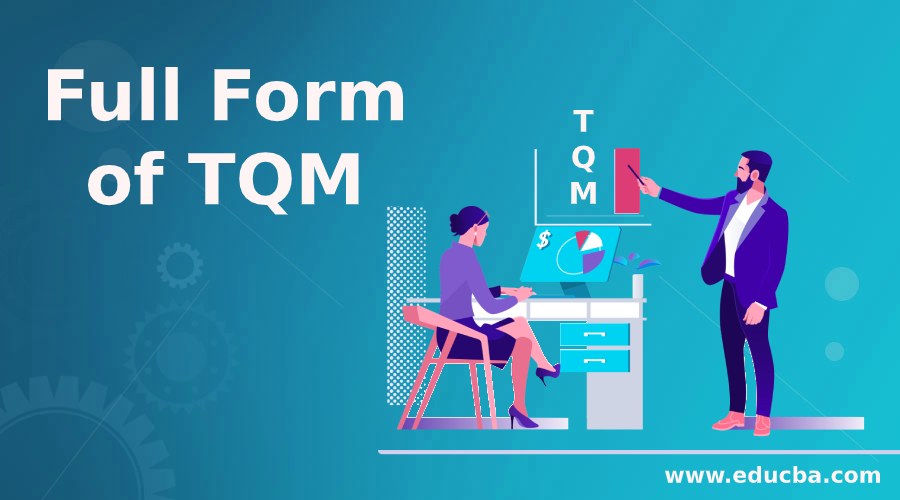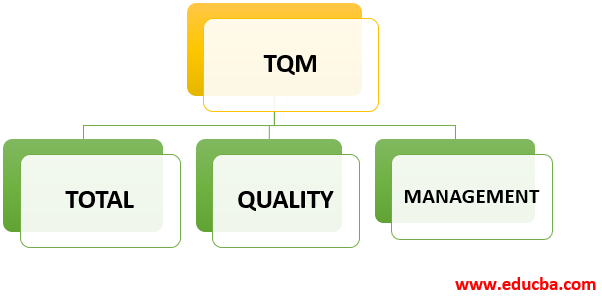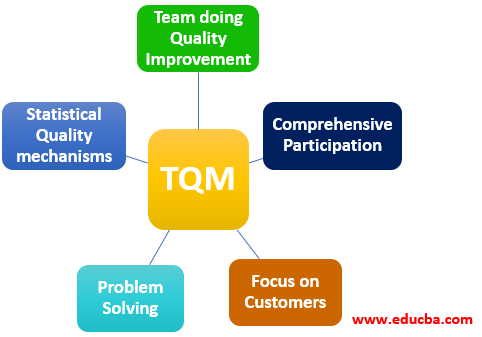Updated February 1, 2023

What is the Full Form of TQM?
The TQM is an abbreviation of three board words which stands for total quality management.
Total quality management can be termed as the streamlined, structured, and extensive management approach that specifically focuses on the continuous quality improvements of goods and services by employing periodic customer feedback. The concept puts an effort to make every participant that is involved in the process of production to be accountable which in turn improves the quality of goods and services supplied to the customer.

Features of TQM
- The approach of total quality management helps in the achievement of the streamlined production process.
- It makes each participant involved in the process of the production to be accountable.
- It is a critical approach that is essentially the building block of continuous improvements.
- They help in building mutual respect and promote teamwork.
- They specifically focus on customers with a structured and strategic approach.
- They help in achieving the benchmarked results along with flexibility in the process of production.
- They help in the assessment of the process capability to deliver conclusive results and if the results are not as per the established benchmarks then the approach provides recommendations on enhanced training which in turn fortifies process capability.
- The total quality management, therefore, advocates of doing process management and process improvements simultaneously.
- It ensures that there is resounding participation among all employees to deliver value addition to the end customers.
Principles of TQM
Following are principles of TQM are given below.
- Deliver quality output for the first attempt and on every consequent submission.
- The concept specifically focuses on the customer
- The approach helps in the identification of new customers.
- External customers purchase the finished products of the business whereas internal customers help in the preparation of finished goods for the external customers.
- It is the core responsibility and the job of the employees of the organization to deliver quality outputs and deliverables to the end stakeholder and hence specific employees should be designated as front-line managers who deal with the customers and understand the needs and requirements of the customers.
- It adopts a strategic approach toward improvements.
- It advocates for continuous improvements.
- It focuses on promoting teamwork among different teams and encourage earning mutual respect for one another.
- To promote the continuous improvement approach, there should be the development of quality improvement teams and measure the participation levels among each team.
- There should be the development of statistical quality control mechanisms.
- With a comprehensive focus on the customers, systematic and Adhoc problem solving should be done to meet up with the expectations of the customers.
Examples of TQM
Let us take the example of the Pharma industry which has adopted a total quality management approach. The handling department of the industry has to ensure that every container has to be taken care of with the utmost care and highly toxic chemicals are to be handled in dedicated enclosures only. This is done to prevent any potential probability of contamination.
The conditions of the environment and storage grounds are to be recorded intermittently to meet quality standards and prevent deterioration of medicines and medical equipment. The packaging and labeling of items should be processed and defined to ensure the standards of quality are met. The labeling and packaging of items should be done with utmost care so that accurate information is supplied to the end customer and supplier.
Importance of TQM
Total quality management is essential for production-based business. They have a high emphasis on continuous improvements of the goods and services offered to the end customers. The principals ensure that all stakeholders of the process and production put their efforts towards the common goals of the product improvements and service improvements. The principles ensure a process to be more capable and compliant to the ever-changing dynamic environment with their focus on customers.
Total quality management is such an essential concept as it systematically motivates the stakeholders to innovate and come up with new disruptive solutions that can either meet or exceed the expectations of the customers.
Difference between Total Quality Management vs Quality Management
- Total quality management can be termed as a comprehensive management approach that focuses on continuous improvements.
- Quality management is a set of procedures and process that delivers outputs of high standards.
- Both approaches have a common emphasis on customer satisfaction. They both adopt a process-driven approach.
- The total quality management approach does not look into the supplier relations but the quality management systems focus on relations with suppliers.
- The total quality management systems integrate organization systems whereas the quality management systems vary from system to system within the organization.
Benefits of TQM
- The approach offers improvement in the quality of goods and services offered.
- The approach helps in increase participation among employees to work towards the common goals of the organization.
- It grooms and nurtures leadership among stakeholders.
- It helps in the development of progressive work relationships and promotes satisfaction among employees.
- The approach helps in better communications in terms of expectations.
- The approach helps in boosting the profitability of the production-based business.
- This approach reduces competition of the business and hence increase their market shares.
- Since the approach helps in solving issues and problems faster, the approach enhances the business reputation.
- It reduces waste substantially as it advocates for getting fewer defective products.
- The approach offers several financial benefits such as higher return on sales and reduction in costs utilized to deliver final output.
- The duplication of efforts is absolutely eliminated due to increased coordination among different teams and stakeholders.
Limitations of TQM
- The approach is a slow process.
- The impact of actions taken according to the principles of total quality management may not appear for a very long duration.
- The employees may show resistance of not complying with the principle of total quality management.
Conclusion
The total quality management ensures that there is comprehensive participation among employees, managers, and stakeholders within a production-based organization. Utilizing this approach reduces the duplicated efforts to achieve common goals and results. The approach ensures that the quality deliverables are delivered to the customer and thereby it enhances satisfaction among the customers.
Recommended Articles
This is a guide to the Full Form of TQM. Here we discuss What is Full Form of TQM along with examples, features, and principal. You may also look at the following articles to learn more –


